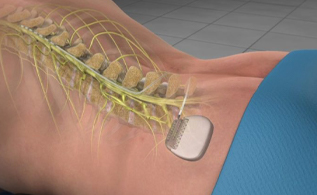Spinal Cord Stimulation

Spinal Cord Stimulation (SCS) is an exciting and relatively new development in the field of Pain Medicine. It provides a way to alter the experience of pain by modulating cell-to- cell communication of pain signals within the spinal cord. The overall effect is to reduce the experience of pain.
This treatment involves the insertion of small electrodes near the spinal cord that transmit electrical impulses. A small battery powered impulse pulse generator (IPG) that is secured beneath the skin provides energy to the electrodes. Various patterns or programmes of stimulation with electrical current are now available to optimise the pain relief each patient experiences. Each patient will work closely with their Pain Specialist and SCS device technician to individually tailor their most effective programme.
Any surgical or invasive procedure carries risks. Before proceeding, you should seek a second opinion from an appropriately qualified health practitioner. Northern Pain Centre can facilitate you obtaining a second opinion. Please discuss this with us.
What conditions can SCS treat?
Spinal Cord Stimulation is most commonly used to treat back, leg (‘sciatica’) or arm pain that has not responded to spinal surgery. Spinal Cord Stimulation can also be effective in treating Complex Regional Pain Syndrome (CRPS) and persistent pain following injury or surgery. Research has also shown that it can be effective in other neuropathic pain conditions.
There are many different spinal cord stimulator devices available for the management of chronic pain. At Northern Pain Centre, our interventional pain specialist determine the appropriate spinal cord stimulator for patients by assessing each patient independently and using up-to-date clinical research and current best practice.
 Trial Phase
Trial Phase
Patients will undergo a temporary trial for 7-10days to determine the effectiveness of the device. A SCS trial involves temporary electrodes being placed within the epidural space and attached to an external trial device that is worn on a belt by the patient for the trial duration. During the trial phase, our patients will complete a daily pain diary to record their progress. At the completion of the trial, the leads will be removed, and a decision will be made whether to proceed to permanent implant.
Permanent Phase
A SCS permanent implant involves permanent electrodes being placed within the epidural space and attached to a small impulse generator/battery, which is implanted under the skin in a site chosen by the patient and pain specialist.
Animation of Spinal Cord Stimulator Implant Procedure
Video courtesy of Bionic Medical Institute
Ongoing management
Often patients will require ongoing support by their health care team and device company to manage the device and any residual pain.
Learn more
- Download a copy of our Spinal Cord Stimulation brochure click here
- Northern Pain Centre Patient Education Sheet – Preoperative Medication List – Category B
- International Neuromodulation Society: Spinal Cord Stimulation
Spinal Cord Stimulator Company Resources
Listed in alphabetical order.
Abbott Medical
- Proclaim IPG Product Manual
- Proclaim DRG Product Manual
- Prodigy MRI IPG Product Manual
- Abbott Medical Website
- Clinical Research
- Patient Information
Boston Scientific
- GP Frequently Asked Questions
- Boston Scientific Website
- Boston Scientific Product Information
- Clinical Research
- Patient Information
Medtronic
Nevro Medical
- GP Frequently Asked Questions
- Senza IPG Product Manual
- Nevro MRI Information
- Nevro Medical Website
- Clinical Research
- Senza RCT
- Patient Information
Saluda Medical
- Saluda Medical overview Evoke system (link)
- How closed loop chronic pain therapy works (link)
- Patient Brochure (link)
- Clinical Research: ECAP-Controlled Closed-Loop Spinal Cord Stimulation Efficacy and Opioid Reduction Over 24-Months: Final Results of the Prospective, Multicenter, Open-Label Avalon Study (link)
- The Lancet: Long-term safety and efficacy of closed-loop spinal cord stimulation to treat chronic back and leg pain (Evoke): a double-blind, randomised, controlled trial. Read here
- Jan 2020 Article: Closed-Loop Spinal Cord Stimulation for the Management of Chronic Back and Leg Pain [Part 1]
- Jan 2020 Article: Closed-Loop Spinal Cord Stimulation for the Management of Chronic Back and Leg Pain [Part 2]: Expert Perspective
- Click here to view the video on 9news.com.au.
- Visit the Saluda Medical website for more information.
- Catalyst: When Pain Persist
Disclaimer
The contents contained within this page are not a substitute for your own independent health professional’s advice, diagnosis or treatment. Northern Pain Centre treats every patient’s condition individually and provides evidence-based treatments to suit this. Treatment’s may vary based on this individual assessment and your medical history. If you would like to find out whether our treatments are suitable for your specific condition, please arrange a consultation with one of our team. Please note there are risks associated with any procedure, and some are more common than others. You should discuss the risks associated with any recommended treatment with your doctor. Before proceeding, you should seek a second opinion from an appropriately qualified health practitioner. Northern Pain Centre can facilitate you obtaining a second opinion. Please discuss this with us.
